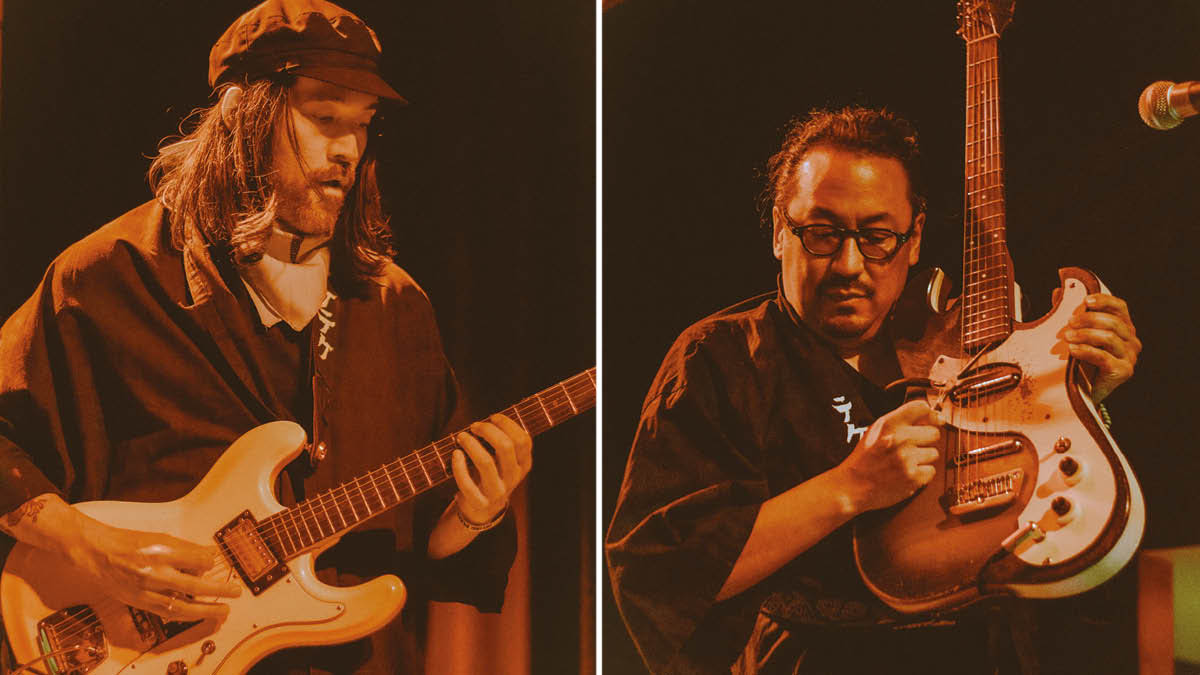“We had a lot of adrenaline. Sometimes we didn’t remember what we did until the day after”: Inside the psych-surf sound of Teke::Teke – a riptide of antique drive pedals, improvisatory freakouts and needle nose pliers
It's surf rock but influenced by Japanese folk, off-the-wall pedalboard choices and Sei Nakauchi Pelletier and Hidetaka Yoneyama's widescreen vision for guitar sound

When Montreal’s Teke::Teke first formed to cover the music of Japanese surf guitar icon Takeshi Terauchi, bandleader Sei Nakauchi Pelletier aimed to capture the explosive, tube-carving essence of his hero’s playing, rather than recreate his gear haul.
Nevertheless, when Pelletier recently found an old Mosrite online – the late Terry’s brand of choice – he knew he had to grab it. Trouble is, his new toy hardly gets as much play as the worn-in Univox Hi-Flier he’s been hauling around since Teke::Teke’s early days.
“I always go back to the Hi-Flier. I feel like it’s just the sound of Teke::Teke,” Pelletier says, citing the vintage offset’s high-set whammy bar and grittier presence as reasons for making it his go-to. “It’s almost too slick, the Mosrite – too hi-fi, somehow. I feel like I have to be delicate.”
On Hagata, Teke::Teke’s second album of originals, the septet crash surf-informed phosphorescence through elements of doom-laden psych-rock and the honeyed bass bump of early ’70s Serge Gainsbourg. Throughout, Pelletier and co-guitarist Hidetaka Yoneyama ride a riptide of rotating wahs, ring mods and antique overdrives.
Live, Yoneyama is also prone to producing teal-textured waves of guitar feedback with the use of portable fans and needle nose pliers. While historically the more ambient player, raw power Hagata highlight Hoppe has Yoneyama going for broke with feverishly abstract, off-meter scale-crawling.
“It used to be more that Hidetaka would do more of the rhythm guitar, and I would do most of the leads,” Pelletier says of the dynamic, “but by the end of Hoppe I’m doing the down-strumming, punk-ish guitar [while] Hide is doing the crazy, weird stuff overtop of it.”
That role-swap is just part of why Pelletier considers Hagata a more “fluidy” album than the band’s 2021 debut, Shirushi. Take how instruments often subvert their origins: vocals are undulated through after-effects; trombones are pipelined through rusted-out Pro Co Rat distortion pedal.
Get The Pick Newsletter
All the latest guitar news, interviews, lessons, reviews, deals and more, direct to your inbox!
And in an explicit nod to Terauchi’s playing, the boisterous, roiling Garakuta finds Pelletier playing close to his Hi-Flier’s bridge to yield a percussively twangy timbre more akin to traditional Japanese stringed instruments like the Shamisen or the Koto.
While Pelletier took on a conductor/composer role for Shirushi, the full band fleshed out and evolved Hagata’s arrangements in the studio – those in-flux conditions often meaning the septet were too caught up in the moment to marvel at what’s become their boldest psych-surf statement yet.
“We had a lot of adrenaline coming out of [us],” Yoneyama says. “Sometimes we didn’t remember what we did until the day after; as we were listening back, [it was like], ‘Oh, that’s so magical!’ A lot of magic happened in the studio.”
- Hagata is out now via Kill Rock Stars.
Gregory Adams is a Vancouver-based arts reporter. From metal legends to emerging pop icons to the best of the basement circuit, he’s interviewed musicians across countless genres for nearly two decades, most recently with Guitar World, Bass Player, Revolver, and more – as well as through his independent newsletter, Gut Feeling. This all still blows his mind. He’s a guitar player, generally bouncing hardcore riffs off his ’52 Tele reissue and a dinged-up SG.
“The main acoustic is a $100 Fender – the strings were super-old and dusty. We hate new strings!” Meet Great Grandpa, the unpredictable indie rockers making epic anthems with cheap acoustics – and recording guitars like a Queens of the Stone Age drummer
“You can almost hear the music in your head when looking at these photos”: How legendary photographer Jim Marshall captured the essence of the Grateful Dead and documented the rise of the ultimate jam band










![John Mayer and Bob Weir [left] of Dead & Company photographed against a grey background. Mayer wears a blue overshirt and has his signature Silver Sky on his shoulder. Weir wears grey and a bolo tie.](https://cdn.mos.cms.futurecdn.net/C6niSAybzVCHoYcpJ8ZZgE.jpg)
